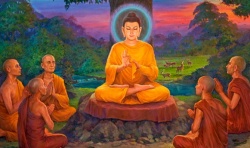Dhamma Day (Asalha Puja Day)
Dhamma Day is observed on the full moon day of the eighth lunar month (July). It commemorates the "turning of the wheel of the Dharma" - the Buddha's first sermon - at the Sarnath Deer Park.
One of the most important festivals of the Theravada Buddhists, the Asalha Puja Day or the Dhamma Day celebrates the first teaching of the Buddha. Elaborating on this, the Buddha gained enlightenment on the full moon of Vesakha - the sixth month. After this, He was not too keen to teach, but on the insistence of His friends who had spent several years journeying the Gangetic plains with Him, He decided to go to Benares. From Gaya, the distance to [[Benares where His friends were staying was around 150 miles and it took Him around two months to reach there. On reaching Beneras, He delievered His first discourse which consisted of the essence, of the all future teachings. At the conclusion of His discourse, one of His five friends Kondañña, exclaimed his understanding of the Truths just preached and urged the Buddha to accept him as a disciple. This was followed by an extremely simple ordination process that gave birth to the the order of monks.
The preaching delievered by the Buddha is quiet often referred to as "setting into motion the wheel of dhamma," It comprises the four noble truths - life means suffering (dukka); origin of suffering is attachment(tanha); cessation of suffering is attainable and finally, the way to cessation is via the eightfold path. Throughout the world, whatever school of thought a Buddhist might belong to, the central doctrine of Buddhism for him still remains the four noble truths.
